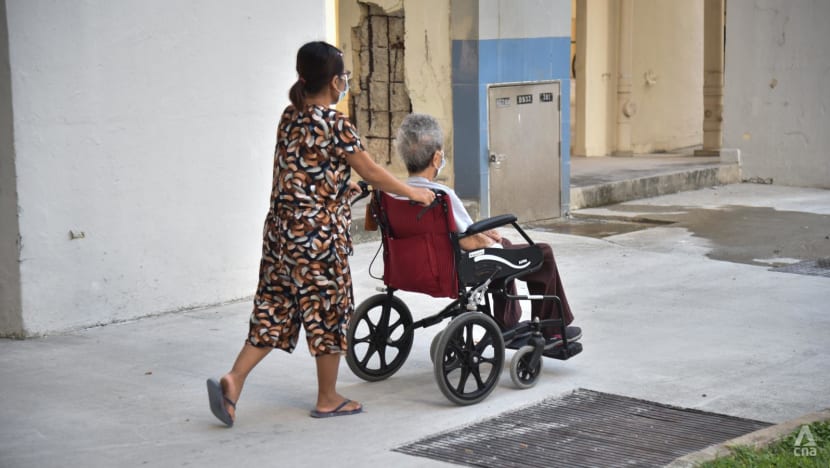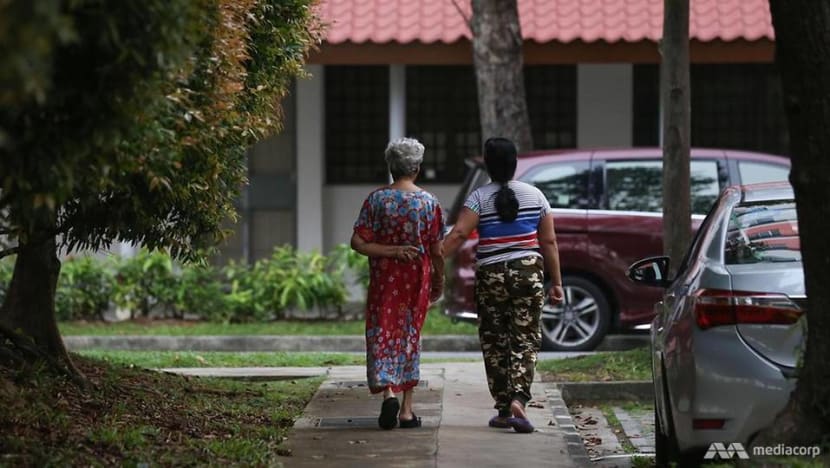Commentary: For maids to provide quality eldercare, employers must move past transactional relationships
Foreign domestic workers are vital but underappreciated as caregivers in Singapore’s ageing society, says Kelvin Tan of Singapore University of Social Sciences.


This audio is generated by an AI tool.
SINGAPORE: My 87-year-old mother was always an independent, active person. But everything changed the day she fell at home and fractured her back and finger. She became wheelchair-dependent, and her cognitive abilities were also affected.
This accident transformed the role of our migrant domestic worker (MDW) from Myanmar, Ms M, from focusing on housekeeping to becoming a full-time caregiver.
With my mother’s increasing needs, the communication barriers between us and Ms M became more pronounced. The intensity of the situation even made us consider hiring a second helper.
Despite these hurdles, an unexpected bond formed in our family. The employer-employee dynamic evolved into something more collaborative, as we worked together to provide my mother with first-class care.
This experience made me realise how vital foreign domestic workers are as caregivers in Singapore’s ageing society.

CRUCIAL ROLE OF MIGRANT DOMESTIC WORKERS IN ELDERCARE
Beyond routine housekeeping, MDWs support seniors in a wide range of daily activities, including medication management, showering, feeding, and transferring them from bed to wheelchair.
MDWs also accompany their employers to hospital appointments, and many work round-the-clock, such as helping elderly family members use the bathroom in the middle of the night.
These demands can become overwhelming, draining both physical and emotional energy. It’s clear that families must support them in return - this requires moving past a traditional employer-employee dynamic. After all, MDWs aren’t just workers - they are live-in members of our homes.
However, this relationship between families and MDWs isn’t without its challenges. Incidents of maids abusing the elderly, children and pets in their care occasionally make headlines in Singapore.
On one hand, these news stories bring attention to the risks of domestic abuse and the need for vigilance. On the other, it may reinforce stereotypes and breed mistrust, overshadowing the often-underappreciated role MDWs play in caregiving.
Instead, we must foster a relationship grounded in empathy, where support between MDWs and employers flows both ways.
A NEW FORM OF KINSHIP
In Singapore, families continue to prefer home care over institutional care to ensure a higher quality of life for their ageing loved ones.
One study in Belgium on person-centred care reveals that older persons who have hired a live-in migrant care worker can reduce feelings of loneliness by building a trusting relationship with the carer.
When employers and their families provide MDWs with warmth and support, the relationship moves beyond mere monetary employment into a form of emotional companionship that is essential for both the caregiver and the cared-for.
Ms S from the Philippines has been an integral part of my godmother’s family for 16 years. In addition to managing my godmother’s daily needs, such as medication and meals, Ms S has become a cherished family member. She not only prepares delicious local dishes but also serves as a loyal companion on family trips.
While the impact of this blurring of lines between employment and companionship may not be unambiguously positive or negative, it is evident that MDWs reshape the social dynamics of the families they’re employed in. The quality of eldercare often hinges on the constant adaptation and negotiation between the MDW, the elderly, and the family.
STRENGTHENING OUR SOCIAL FABRIC
Singapore employers can certainly do more to support MDWs. Building trust, exercising patience and leveraging technology are key to creating a more inclusive environment, one that flattens the hierarchy of command and encourages mutual respect. �ċ�ċ�ċ
In our communication with Ms M from Myanmar, we use tools like Google Translate to help bridge the language gap, alongside pictorial sketches and gestures for clarity.
Additionally, we encourage Ms S to attend orientation classes to familiarise herself with local languages and dialects. Likewise, we can make an effort to understand and appreciate the diverse cultures of the MDWs we employ.
People remember how they were treated far more than what they were paid for the services they provided. Therefore, we can offer incentives beyond increased wages such as short overseas trips or a nice meal out for dedicated MDWs, where possible.
Most employers aim to cultivate long-term relationships with the ideal MDW, as this reduces the stress of repeatedly searching for new ones and fosters a stable, respectful working environment.
Ultimately, enhancing the support for MDWs will reflect our collective commitment to a more compassionate and equitable society. By valuing their contributions and addressing their needs with empathy and foresight, we can ensure that the caregiving ecosystem remains resilient and responsive.
Kelvin Tan is the head of the Minor in Applied Ageing Studies programme at the Singapore University of Social Sciences.













